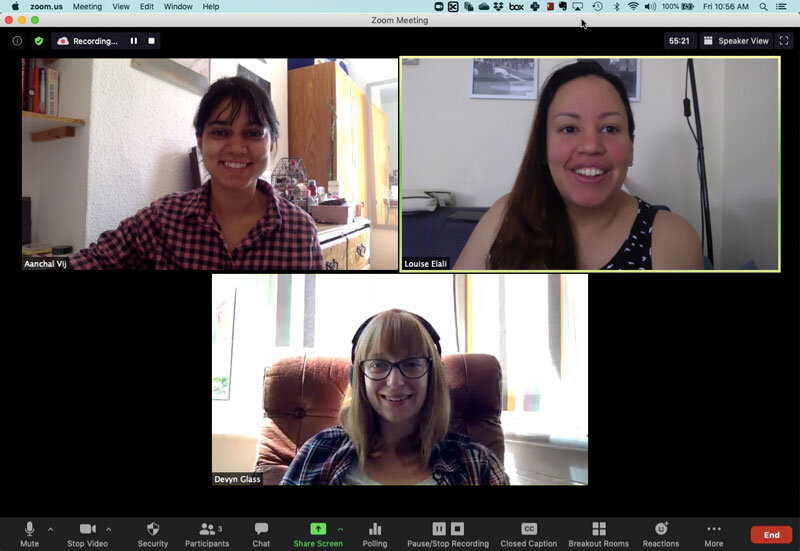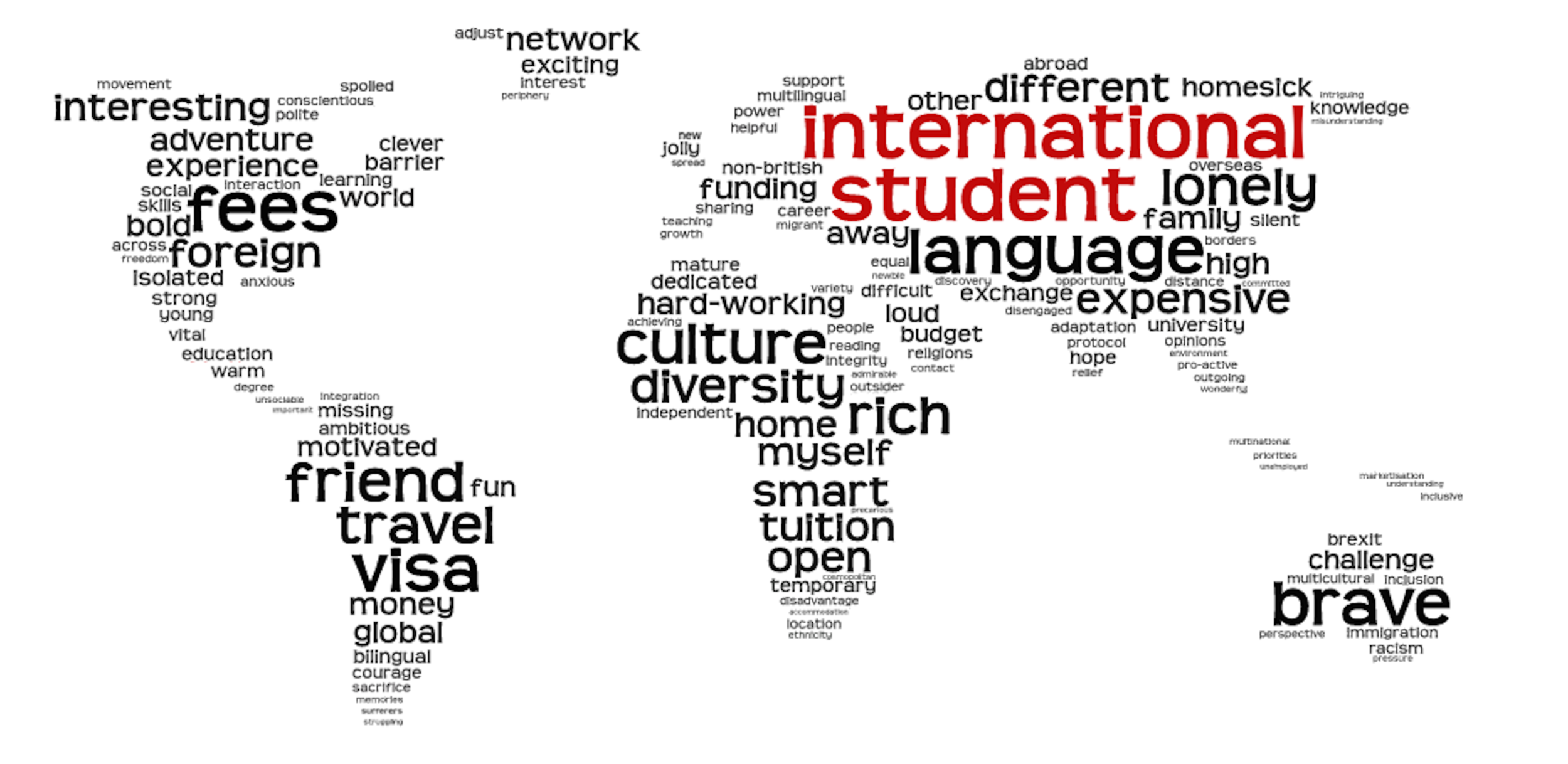Zooming into a PhD: A conversation with Louise Elali
By the Sussex Hive Scholars - Aanchal Vij, Louise Elali and Devyn Glass
How are international students affected by COVID-19? Were there any surprises when conducting interviews online? What does it feel like to be part of the group you are studying? These are just some of the topics that came up when the Hive Scholars sat down to discuss the research being done by one of our own!
We, Aanchal, Devyn and Louise, are this year's Hive Scholars. With support from SAGE, we have been working all year to foster a research community at the University of Sussex (especially during lockdown!). But we are also using our frequent Zoom meetings to learn about each other’s research, and we want to share our conversations with the SAGE community.
In this series of conversations, we will introduce ourselves, our research and report on how COVID-19 and lockdown has impacted our work. First up: Louise talks to Aanchal and Devyn about international students, identity, social media, and how hard it is to just sit down and write during a pandemic.
Devyn: So do you want to introduce yourself, to start with?
Louise: My name is Louise. I'm from Brazil. I’m in my third year I guess – which is very weird to say because it feels like it's been longer, and like I started yesterday all at the same time. I have a background in communications and psychology. I've always been very interdisciplinary and my PhD is not an exception. I’m based in the School of Media. I have one supervisor there and one in the School of Education.
Devyn: I didn't realise you had a supervisor in education actually.
Aanchal: Do you want to tell us what your PhD is about?
Louise: At its core, it's about identity and how social media became such a big part of our identities these days. But I’m looking at that through the lens of a case study, which is international students. So basically, I'm looking at international students’ experiences, and how they use social media and how they may or may not be building their identities as international students but also as you know, themselves, on social media. And by the way, when I talk about students, I’m only talking about PhD students – my research doesn’t include any undergrads or Masters students.
Devyn: So where does the education aspect come in?
Louise: It’s because of the focus on students. And then to talk about international students in the UK I have to be able to talk about the context, and the marketisation of higher education. I don’t have any background on that. So when I started my PhD, that was basically my first big task – my supervisors understood that I know what I am talking about when it comes to social media and identity, but I needed to dive deeper into the education side of things.
Aanchal: When you say you are looking at how international students think about their identity, are you focusing just on the time they are in the UK, at university? Or is it more in general?
Louise: Well, I'm looking at their time as an international student. Being an international student – it's a very intense time in your life. It's a time where everything's changing. You're changing a lot and at the same time, because you are not from here, you probably don't have a strong support system in the country where you're at. So social media can have a much bigger role in their lives, than it might have for home students. And I don’t mean that UK students don’t use social media. I'm just saying that it is sort of a lifeline for international students. Although I feel like right now, because of COVID-19 and everything, social media is a lifeline for everyone.
A word cloud from Louise’s data collection.
Devyn: Have you finished collecting your data?
Louise: Funnily enough, I finished my interviews during the first week of lockdown.
Devyn: So basically before COVID-19.
Louise: So my data collection is quite intricate, because I have a lot of different aspects coming in. So one layer of my data collection is talking to people, and that part is already quite long because it had three stages: I started with surveys, then moved on to focus groups and then I did interviews.
I was about to do my last few interviews when COVID-19 hit the UK. I had to move them all online very quickly. I have to say, I was a bit disappointed and I wasn’t sure I wanted to do the interviews online. But then I did the first one and I found out you can get automatic transcripts…
Aanchal: That's amazing.
Louise: I was upset I didn’t do my focus groups online! Haha
Devyn: Do you think that COVID-19 impacted international students? How did your interviewees speak about social media in your interviews compared to the focus groups and surveys?
Louise: I think that the biggest impact of COVID-19 on international students is not necessarily on how they're using social media because I don't think that changed. I feel like international students who stayed in the UK (by choice or lack of flights) were not the most affected by, you know, social distancing, because they already tend to spend a lot of time by themselves because they don't have a huge support group in the country. I think the way that they did get affected when it comes to social media was in getting the news from home, on top of UK news, and all. They worry about how people from their home country are doing and they can't do anything because they're not even there.
Devyn: We get so much more news from social media now as well, especially on things like this.
Louise: And I think a lot of the news from their home countries that they are getting, they're getting from their families telling them about it.
Aanchal: I imagine so. Because BBC tends to not cover news about other countries so much. So, even for me, social media is mostly where I get news from. But I wanted to ask, you are also an international student…
Louise: You bring up an interesting fact, which is the fact that I'm obviously part of the group that I am studying. That has always been interesting, but I think it is an advantage because I think it helps with, like building a rapport with the participants.
For the focus groups, I was there, but I also had a second researcher, who was another international student from media, with me. And I always started out introducing myself and introducing him, and I always mentioned we are both international students so “we are keeping it in the family” and that would get a lot of laughs and break the ice.
With the interviews, there was often an instant understanding of having a “shared experience”. I feel like a lot of the interviewees opened up much more, because they felt like I could relate to where they were. And that's not saying that other people can't relate, but having that common ground to stand on, I think it helps a lot. Like it's not the outsider looking in.
Devyn: So you mentioned obviously adapting to COVID-19. Were there any other major challenges in your research?
Louise: I had basically finished the interviews, so I thought it would be smooth sailing. You know, in theory, I could use isolation to dive into my data and write. But it's so difficult to concentrate on writing right now. It was much, much easier to do the interviews: I was focusing on another person and that seemed easier, but focusing on data and writing it's quite difficult.
Devyn: Being able to get yourself into the zone… I definitely feel you. So you are kind of nearing the end of your PhD. Are you at the stage that you're just that you're writing up and analysing now and aiming to be finished?
Louise: I think technically… we've been talking about data collection, and we've been focusing on the “people centric” data so far, but I have a few other streams of data collection that are not quite finished yet. So I probably need to do that. But I do have mostly analysing and writing up left to do now.
Devyn: Do you have any plans for after your PhD, or ideas of how you want to use your PhD in the future?
Louise: That's a very, very big question.
Devyn: I know. Sorry.
Louise: If you had asked me that six months ago, I would have a very clear answer along the lines of “UK universities need international students to make money. So understanding those students’ needs would make their university so much stronger, both in attracting those students, but also in like, looking after them.” But right now, COVID-19 is shaking up the landscape of higher education.
At the same time, I almost feel like whatever I learned about international students is applicable to most people at the moment, because it's a similar sense of isolation: you're only really communicating with your family via social media, you can’t physically meet them. So it's almost like everyone is a little bit like an international student right now.
If you want to know more about Louise, follow her on twitter at @LouiseElali. And check back soon to learn about Aanchal’s and Devyn’s research and lockdown lives!


